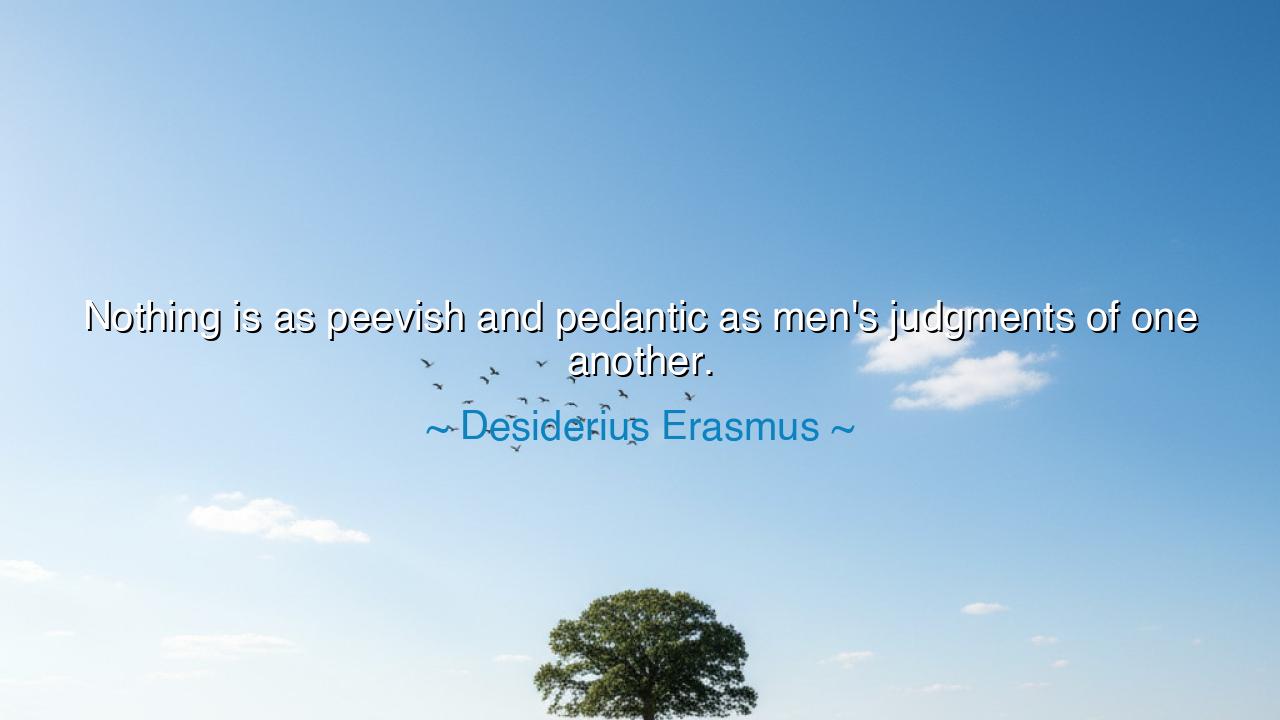
Nothing is as peevish and pedantic as men's judgments of one






Hear the words of Desiderius Erasmus, scholar of the Renaissance, who with sharp vision saw into the pettiness of men: “Nothing is as peevish and pedantic as men’s judgments of one another.” In this saying lies a warning as ancient as time: that men, though blind to their own flaws, are eager to weigh and measure their fellows with the cold scales of criticism. Their judgments are not born of justice but of irritation, not of wisdom but of vanity, and they reveal more about the judge than the judged.
To call such judgments peevish is to name them for what they are—petty, impatient, and often springing from envy. The eye that delights in finding fault is an eye clouded by its own bitterness. And to call them pedantic is to reveal how men dress their small-mindedness in the robe of learning, wielding words and arguments not to uplift but to belittle. Thus, the act of judgment becomes less about truth and more about self-importance. Erasmus, wise in human folly, unmasks this tendency and shows us its futility.
History testifies to this in countless tales. Recall the life of Galileo, who dared to look upon the heavens and proclaim that the earth moved around the sun. His vision was revolutionary, yet what greeted him? Not the embrace of truth, but the peevish judgments of men who feared change. Cloaked in pedantry, they condemned him, not because he was wrong, but because his truth wounded their pride. Their judgments did not reveal the weakness of Galileo, but the weakness of their own hearts.
Nor is this fault confined to ages past. Consider how Socrates, the gadfly of Athens, was put on trial for “corrupting the youth” and “impiety.” The charges were no more than pedantic judgments, woven from envy and fear of his probing questions. The men who condemned him proved nothing about Socrates, who drank the hemlock with serenity, but much about themselves—their smallness, their insecurity, their desire to silence what they could not understand.
The teaching of Erasmus is thus not merely a criticism, but a call to humility. If men’s judgments are so often petty, let us not be quick to join their chorus. The wise man remembers his own flaws before condemning another’s. He knows that what he sees in others is often a reflection of what he fears or despises in himself. Better to turn the eye inward, to correct one’s own soul, than to indulge in the bitter sport of tearing others down.
Practical is this counsel: before you pass judgment on another, pause and ask yourself, “Do I speak from truth, or from envy? From justice, or from irritation?” If you must correct, let it be with gentleness, not malice. If you must speak, let it be to build, not to wound. And often, the greatest wisdom is silence—for silence spares both the speaker and the hearer from the poison of peevishness.
Therefore, O listener, engrave this truth upon your heart: “Nothing is as peevish and pedantic as men’s judgments of one another.” Do not delight in fault-finding, nor join the multitude of critics who gnaw at their neighbors. Instead, rise above the smallness of judgment, and cultivate understanding, mercy, and patience. In doing so, you free yourself from the chains of bitterness, and you offer to the world not the weight of condemnation, but the light of compassion.
Thus remember: a man’s true greatness is not shown in how sharply he judges others, but in how deeply he masters himself. And he who masters his tongue, restraining it from pettiness, becomes not a destroyer of men, but a builder of peace.






AAdministratorAdministrator
Welcome, honored guests. Please leave a comment, we will respond soon